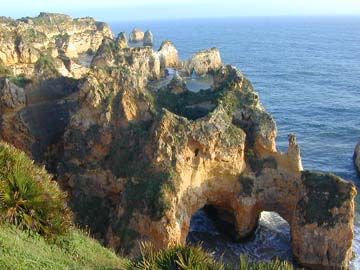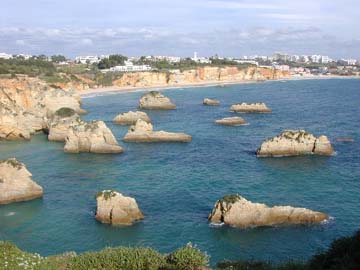|

 by John Clare by John Clare
Lunch on the Beach
With the coming of the new year the prickly pear fruits begin to ripen.
It is after all, still winter. The rains are frequent (exceptional this
year); it gets cold at night, with the temperatures sometimes below
zero. But everything looks bright and clean. The Algarve is, wherever
you look, a veritable garden in bloom.
Towards the end of January the mimosa starts to flower. Great yellow
bunches tumble down to the river just below my hillside.

In front of me
the shallow water spreads out, wandering around the banks of gravel. At
high tide all the gravel will be covered in one expanse of water, now
the river falls over the waterfall beneath the bridge, and races over
the smooth gravel. A few butterflies flutter across the water. Solitary
bees come down, settle on the edge of the gravel to drink the water,
then fly off to stick their noses back into the white petals of the
wild roses. Behind the hill is a row of bee hives, and back on my
kitchen shelf is a jar of the thick rich honey they produce. It tastes
and smells delicious.
All along the roads the mimosas come into blossom one by one, until
there is a yellow avenue for miles. The almond blossom is already out,
some pink, some white.
Just to the west of Ferragudo is a whole coast of caves and tiny
beaches. Everywhere the rocks have been eaten away to form the typical
Algarvean coastline. The rain comes, and the carbon dioxide in the rain
eats into the rock, and the rock splits, and then the relentless
pounding of the sea does the rest. Great chunks suddenly fall away from
the cliff edge, and where there was once a path there is now a pile of
rock at the bottom of a cliff.
One tuesday evening I drive the car to a point between Praia da Rocha
and Alvor to watch the senset over Lagos and Cape St Vincent. I get out
and walk the last few metres. There are a couple of dozen people on the
cliff watching the ending of the day. The sky is almost cloudless,
there will be no spectacular sunset, just the slow descent of the sun
as it expands on reaching the horizon.
Three days later I am there again, and the track I drove down on
tuesday is no longer there. In its place is a great gash in the earth.
I peer gingerly over the edge to see a pile of red earth and rock on
the beach two hundred feet below.

All along the coast the sea beats at the crumbly rock, gnawing great
caves at high water mark. The sea rushes in, pounds at the further end,
and the rocks split some more, and a bit of the ceiling caves in. The
sea soon pounds that to sand, and eventually a bit more falls in. In
some places over the centuries, where there is particularly faulty
rock, the whole of the roof falls in, and you now have a hole some
distance inland which drops right down to the sea. If you peer over the
edge, you can see the sea surging in, swilling round the bottom of the
hole, and retreating again, leaving a clean stretch of sand.

And so, as you progress along the coast you find caves, like patios
behind great arching nayas of rock, then a mysterious channel of water
leading in to a blow hole, or algare, and then, further along, a small
beach in a bay, perhaps a hundred metres from side to side, very often
with no way down from the top of the cliffs.
In one of these bays, barely a hundred metres wide, but with a service
road running down the valley right to the edge of the bay, is a
restaurant built on stilts backed right against the cliff. Facing south
is a wide verandah, with tables overlooking the beach.
You sit at your table and order your meal. The sun shines down on
table, beach and sea. The littoral is just too enticing. You can jump
over the balcony right onto the beach, and paddle thru the rockpools
while the kitchen is busily cooking your meal. A shout from the
verandah, and you look up. The jug of sangria has arrived, and someone
is holding up a glass of iced red wine. You walk back to the balcony,
reach up, and now you can paddle with a glass of cool wine in your
hand. Ten minutes later there is another shout. Your dinner has arrived.
For the next hour you can lazily eat, and absent-mindedly drink, as you
watch the waves rattle and splash over the rocks, and whizz up and down
the beach, the rushing water edged with bubbly lace. The sun slowly
moves westward. The chatter from the other tables rises and falls. The
tide comes in, the fishermen arrive, and stand on a big rock to the
west of the bay; and time seems to forget to move on.
(This
is an excerpt from my book on life in the Algarve)
|